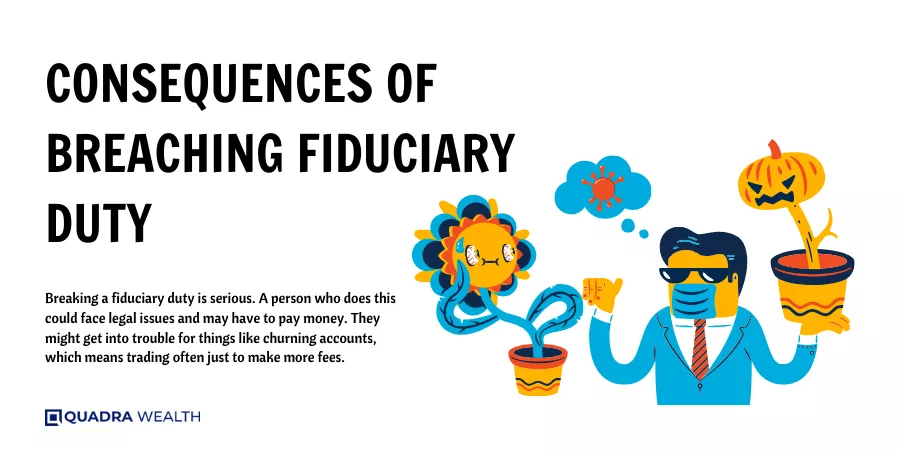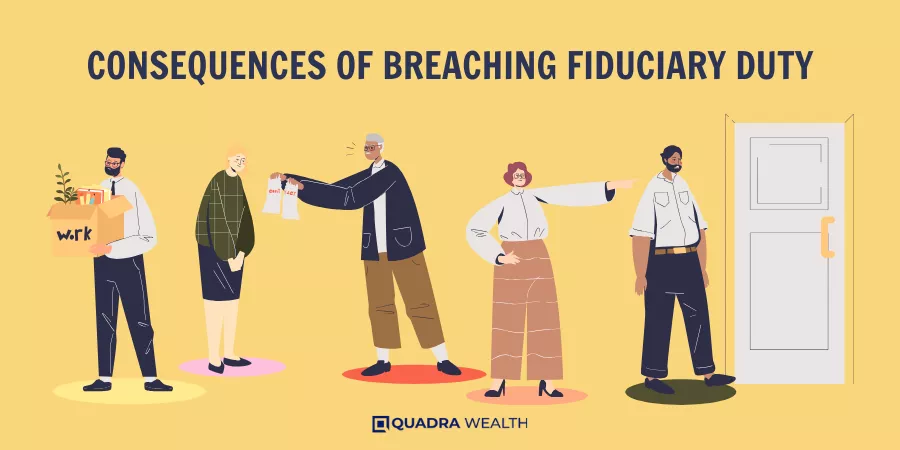In This Article
The Importance Of Choosing A Fiduciary Financial Planner

Navigating the world of investments and finances can often be intimidating, especially without expert guidance. Did you know a staggering 69% of Americans have less than $1,000 in savings? If this rings a bell for you, don’t worry – our guide is here to make things easier.
By understanding how important it is to select a fiduciary financial planner over just any advisor or broker-dealer, we set you on the right path towards wealth accumulation and security.
Ready to boost your financial wellness? Let’s dive in!
Key takeaways
● A fiduciary has a legal duty to put your money needs first. They make choices based on what's best for you, not them.
● Fiduciaries should tell you about all costs upfront. There are no hidden fees with them.
● The bond between a fiduciary and client is special and full of trust. This type of advisor works hard to boost your wealth the right way!
● If laws tied to fiduciaries aren't met, people could face legal problems or need to pay money back.
Understanding Key Terms
In order to fully comprehend the importance of a fiduciary financial planner, you must first understand key terms such as “fiduciary,” “fiduciary duty,” and how these roles differ from typical financial advisors and planners.

Definition of a Fiduciary
A fiduciary is a person or group that must do what’s best for someone else’s money. They have to be fair and can’t use their position for personal gain. For example, certified financial planners and investment advisors are often fiduciaries.
They help people make wise choices about money problems and investments while keeping their clients’ needs first.

What is Fiduciary Duty?
Fiduciary duty is a key term in finance. It means that someone, called a fiduciary, must act in the best money interests of another person. This is not just nice – it’s their legal job.
Fiduciaries like financial planners have to pick investments and plans that fit their clients best. They can’t let other things get in the way of this duty.
This strong bond sets them apart from others who may offer money advice but don’t have to hold themselves to the same high standard. Every choice they make should be for you – not for them or anyone else!
Fiduciary vs. Financial Advisor vs. Financial Planner
It’s crucial to understand the differences in responsibilities and obligations between a fiduciary, a financial advisor, and a financial planner. While they all play important roles in financial decision-making, there are significant differences among them.
Fiduciary | Financial Advisor | Financial Planner |
A fiduciary has a legal obligation to act in the client’s best financial interests. They must avoid conflicts of interest and establish a bond of trust with clients. Fiduciary duty requires them to recommend investments and financial planning products that are best for their clients. | A financial advisor is a professional who provides financial advice on matters relating to investing, retirement, insurance, mortgages, college savings, estate planning, taxes, and more. However, not all financial advisors are fiduciaries, which means they may not be legally required to prioritize your financial interests above their own. | A financial planner is a type of financial advisor who helps individuals and corporations meet long-term financial objectives. Financial planners can also be fiduciaries, but they need to be certified or registered to meet this standard. They can help with planning for retirement, education, estate, and investments, depending on their qualifications and specialized areas. |

The Role of a Fiduciary Financial Planner
A fiduciary financial planner provides extensive services such as portfolio management and advice on financial issues, all while adhering to the highest standard of care for clients by putting their interests first.
Portfolio Management
A fiduciary financial planner looks after your money. They check all of your investments to make sure they are doing well. These people have the legal right to make decisions for you about what stocks or bonds to buy and sell in your portfolio.
This is called “portfolio management”. A good fiduciary wants your portfolio to grow so that you can be secure with your wealth in the future. Their job also includes keeping track of market performance, risk tolerance, and client’s assets.

Financial Advising
A financial advisor guides you to make wise money decisions. They take care of your wealth and help set financial goals. Moreover, they teach you about investment choices and risk control.
A fiduciary advisor does all this, but their duty is higher. They must put your needs before theirs. This means their advice must be the best for you, not for them making a profit.

Duty to Clients
A fiduciary financial planner puts the client first. They have a duty to you, the client. This means they always act in your best interest. This is not just nice words – it’s law! If services do not meet your needs, or there are cheaper options out there, a fiduciary has to tell you.
Putting clients’ needs before their own profit sets them aside from other financial employees. A great example is if two funds are doing equally well but one pays the advisor more – they have to suggest the fund that doesn’t cost more for you! Their job is to make sure you get what works best for money-wise conditions and goals.
Trust is key here as these advisors want to build strong relationships with clients over time.

The Importance of Choosing a Fiduciary Financial Planner
Choosing a fiduciary financial planner ensures utmost transparency in costs and dedication to your best interest, setting a high standard of professionalism that transforms your financial wellness journey.
Discover more about this pivotal choice on our blog!
Fiduciary Duty vs. Suitability Standard
A fiduciary financial planner must act in the best interest of their clients. This rule is known as the fiduciary duty. It means they only think about your needs when giving you advice.
On the other hand, some advisors follow a suitability standard. They believe an investment is good for you but may not be the perfect fit. So choosing a fiduciary gives you peace of mind because all actions taken are with your best interests at heart.

Transparency in Costs
You always know what you are paying a fiduciary. There is no hidden cost. Fiduciaries lay out all charges up front. They make money by charging you a fee for their services. This way, your goals and theirs match.
Some advisors earn commissions when they sell certain goods to clients. It could lead them to push those items more, even if they aren’t the best pick for you. But fiduciaries don’t act this way because they only charge fees and must put the client’s interest first.

High Standard of Care
Fiduciary financial planners aim for a high standard of care. It’s their job to put your needs first, always. They work hard to make the best financial choices for you. Trust is very important in this role, and they work hard to keep it with honest actions and clear costs.
The legal obligation they have forces them to avoid any conflict of interest too because they know your wealth matters most. Your financial wellness depends on how well they do their jobs!
Types of Fiduciary Relationships
Fiduciary relationships are not limited to financial planning alone; they span across various fields like legal, corporate and property realms where trust is paramount, as seen in relationships between clients and lawyers, shareholders and boards, guardians and wards.
Financial Advisors and Clients)
Financial advisors help people make smart money choices. They and their clients form a vital group for fiduciary relationships. An advisor with a fiduciary duty puts the client’s needs first.
They must look out for what helps the client most, not what earns them the most pay. This is different from other types of financial helpers who can suggest products that earn themselves more income but may not be best for the client.
It matters to know if your advisor is a true fiduciary because it affects your wealth growth and future plans.
Guardians and Wards
Guardians and wards are in a special relationship too. A guardian takes care of someone who cannot take care of themselves. The person being cared for is called the ward. Wards might be kids, adults with disabilities, or old people who can’t make their own decisions.
The job of a guardian includes health choices, teaching needs, having control over money matters for the ward. Whatever choice the guardian makes is all about what’s best for the ward.
The law watches over how well guardians do their jobs and might ask them to put down details about any changes with in money or other serious problems with the ward from time to time.
Boards and Shareholders
In a company, the board of directors and shareholders share a fiduciary link. A member of the board must act in ways that are good for the firm and its owners — the shareholders.
If these duties aren’t met, this could lead to law issues. The idea is just like picking a money planner who puts your needs first. So boards and shareholders also need to pick financial advisors with care.
They make sure they work by rules that put their clients first: Registered investment advisors are required to do this under law.
Lawyers and Clients
Lawyers have a big role to play in fiduciary relationships. They must act for their clients’ good. They need to act fair and right as per law. This means they must put the client first and keep all talks secret.
Any choice the lawyer makes should help the client’s money matters above all else. It is key that lawyers avoid any type of interest clash with their clients to keep trust strong.

Consequences of Breaching Fiduciary Duty
Breaking a fiduciary duty is serious. A person who does this could face legal issues and may have to pay money. They might get into trouble for things like churning accounts, which means trading often just to make more fees.
Other reasons can be lying about something important or doing trades without asking first.
Negligence is also a breach of fiduciary duty. This happens when the fiduciary doesn’t take enough care in their work. The effect of taking advice that’s not true can hurt people’s retirement savings plan and lead to lower returns on their investments.

How to Identify a Fiduciary Financial Advisor
To identify a fiduciary financial advisor, ensure the professional is registered with appropriate bodies like the Securities and Exchange Commission (SEC) or Financial Industry Regulatory Authority (FINRA); also check if they possess certification licenses such as Series 7, 65 or 66; and finally confirm their membership with renowned trade associations such as Certified Financial Planner Board (CFP Board) or National Association of Personal Financial Advisors (NAPFA).
Registration
To know if your financial advisor is a fiduciary, you must check their registration. They ought to be a registered investment advisor. These advisors are legal fiduciaries. On-line tools like FINRA’s BrokerCheck database can help with this.
This tool tells you about an advisor’s history and duty level. You can also use the SEC’s Investment Adviser Public Disclosure tool for this task.
Series 7 License
The Series 7 License is a key identifier for a fiduciary financial advisor. It tells you that the person has met important rules. They have taken and passed serious exams about money plans.
This license is tied to persons who give advice on stock and bond trades. You can check if your advisor has this using helpful tools like FINRA’s BrokerCheck database or the SEC’s Investment Adviser Public Disclosure.
Act smart and look at these websites before picking an advisor!
Series 65 or 66 Licenses
You need a Series 65 or 66 license to give money tips and plans. People with these licenses have rules to follow. They must choose things that help their clients the most. To get these licenses, you take a test on making money choices, doing right actions, and knowing the laws.
The Financial Industry Regulatory Authority (FINRA) looks at how people with these licenses do their work.
Membership in Trade Associations
Trade groups like NAPFA and FPA are key parts. They show that a money guide sticks to the right rules. To join these groups, one needs to meet tough terms. This means they must have good learning and work history.
Being in a trade group helps give peace of mind to clients. Clients feel happy knowing their money helper is part of a good group. These trade associations also help their members learn more new things about doing the job well.
Conclusion
Taking help from a Fiduciary Financial Planner is key. This person must keep your interests first. They manage your money well, avoid conflict, and always meet legal duties. Making the right choice can mean less worry over money now and in the years to come.

FAQs
A fiduciary financial planner is a wealth advisor who legally must put your needs first. They provide investment advice and help in managing investments.
Fiduciaries are bound by legal standards to keep your best interests at heart, avoiding any form of misconduct like unauthorized trades or account churning.
Yes, some robo-advisors follow the ERISA’s fiduciary rules. This means they give unbiased advice that follows the Client’s assets management via automated digital platforms when you authorize them.
You can use tools like Financial advisor’s Form ADV and Form CRS given by the U.S Securities and Exchange Commission (SEC). It helps you learn more about their practices and fees.
Risk exists with nonfiduciaris as they need not always have to act in your best interest according to law but still it depends on individuals ethics at times.
Yes, Fee-only advisors charge fixed rates unlike Fee-based ones who might earn commissions when selling certain financial products hence there is clearness in charges which may benefit you financially.

Why You Need a Personal Financial Manager?
Personal finance management (PFM) is not confined to budgeting and investment any longer. There are

Nearing Retirement Advice for a Secure Future
Nearing retirement advice? A plan for retirement is essential to enjoy a happy healthy life

What is Debt Ceiling? A Complete Guide for Beginners
What is Debt Ceiling? Debt Ceiling, also known as the debt limit, is the highest

Is It Possible to Have No Debt?
Debt is often considered the norm in the corporate world, but the debt free companies




